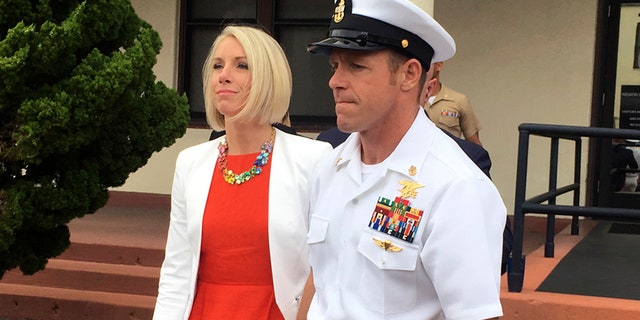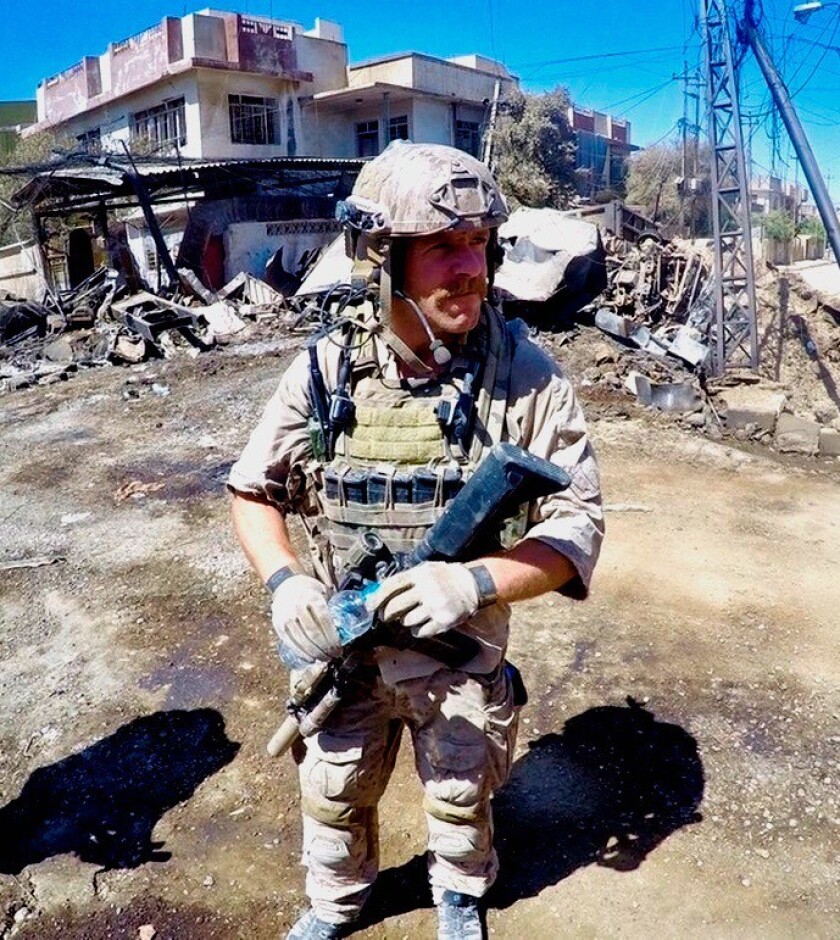:quality(70)/arc-anglerfish-arc2-prod-mco.s3.amazonaws.com/public/MW56MTM4JNHFLKURY4HPO3BLVA.jpg)
(Special Operations Chief Edward “Eddie” Gallagher, a highly decorated Navy SEAL, is fighting murder charges tied to the death of an Islamic State operative in Iraq).
It is clear that after recent events that the American experience in Afghanistan did not end well. With the Taliban victory the future of the Afghan people, especially women are under a darkening cloud. In this environment the American military approach in the region has come under question and many of the soldiers who fought and the families of those who died or suffered life altering injuries must be wondering if their sacrifices were in vain. In this environment any book that deals with the American approach to war is timely. David Philipps’ new book, ALPHA: EDDIE GALLAGHER AND THE WAR FOR THE SOUL OF THE NAVY SEALS fits this category. Though the book focuses on the conduct of American troops in Mosul, Iraq, many of the Navy SEALS involved in the narrative fought in Afghanistan and their approach to combat was carried over to Iraq.
Philipps’ effort focuses on Navy SEALS of Alpha platoon and its Special Operations Chief Eddie Gallagher, in addition to a deep dive into the culture and daily lifestyle of the troops involved. Philipps’ work encompasses Gallagher’s last deployment as Chief of Alpha Platoon, SEAL team 7 whose 2017 classified mission was to assist Iraqi troops in clearing ISIS from the Iraqi city of Mosul. In the first few weeks of the deployment Gallagher saw more combat than he had in his first seventeen years in the Navy. After returning home he would be arrested and charged with murdering a wounded ISIS soldier, beginning a two year fight that culminated in a trial as to whether the accused was guilty or not. According to Phillips a battle over what the SEAL teams stood for, and what they would become with consequences that would reverberate for years.
According to the prosecution, Gallagher had become unglued, he lied to get medals, put men in danger to build up his own combat resume, shot at women and children in civilian areas, and murdered a prisoner in cold blood. According to Gallagher and his defense team the accusations stemmed from misguided and inexperienced members of Alpha who refused to go out on ops and created stories to cover up their own cowardness. When his team called him out, Gallagher claimed they were cowards.

(Navy Special Operations Chief Edward Gallagher leaves a military courtroom on Naval Base San Diego with his wife, Andrea Gallagher, on Thursday, in San Diego)
Phillips does an excellent job developing the culture that existed within the ranks of the Navy SEALS. He traces groups of SEALS who are referred to as “Pirates,” men who fought in World War II, Vietnam, Afghanistan, and Iraq whose attitude was clear – when dealing with unconventional war, be it terrorists, Viet Cong, the Taliban or ISIS the normal rules of war do not necessarily carry the day. The overriding theme that Philipps explores was that these “Pirates” operated in an environment where they could commit violent acts, even murder with no accountability where testosterone dominated. They believed that the new generation of SEALS was soft, and they had their own network that did not do justice to SEAL tradition. Eddie Gallagher was a “Pirate” and throughout his career, no matter the offence, leadership looked the other way and allowed him to rise through the ranks to the position he found himself in Mosul.
Throughout the deployment Gallagher did not perform the expected duties of a Chief, i.e., plans for the day, imparting tactical information, and played squads off against each other by bad mouthing men behind their backs. His goal seemed to be to take the role of a sniper, though the team had highly trained snipers and see how many he could kill, even firing randomly and using up ammunition. Most snipers would fire off one or two rounds per day, and some days did not fire off any rounds, Gallagher seemed to average well over twenty per day. Some of his strategies put team members in danger as he tried to build up his reputation as “a nasty ass killer.” Eventually team members began to feel he was a detriment to their mission, and he needed to be removed, particularly when he stabbed a wounded prisoner in the neck, watched him die and then took a photo holding him up by his hair remarking what a killer he was.
Philipps’ narrative is very troubling. He does yeoman’s work presenting the most important characters and explaining why their roles were so important to the drama that unfolded. Chief Petty Officer Craig Miller, Gallagher’s second in command will organize the men that will lead to accusations against their Chief; Lieutenant Jake Portier, the officer in charge refused to control or mitigate Gallagher’s behavior and threats; Special Operators First Class, Dalton Tolbert, Josh Vriens, and Dylan Dille, all snipers; Special Operator Corey Scott, a medic who witnessed the stabbing of the POW; Lieutenant Commander Robert Breisch, the commanding officer, an old friend of Gallagher stonewalled any investigation; Navy Special Warfare Group One Commodore Captain Matthew Rosenbloom, in charge of all SEALs on the West Coast who was appalled by Gallagher’s behavior and pushed for prosecution; Timothy Parlatore, a mob trained lawyer who led Gallagher’s defense team, are among the many individuals that Philipps introduces who will play important roles in the narrative.

(Map of Mosul city, northern Iraq)
The battle scenes reflect the absurdity and danger of urban guerilla warfare which are described in intimate detail. However, the most fascinating aspect of the book is the role played by Andrea Gallagher, Eddie’s wife, FOX News, other rightwing outlets, conservative politicians, social media, and of course President Donald Trump who was part of an organized a media campaign to win over the public to Gallagher’s innocence. In fact, as Philipps assiduously presents the trial it is clear that there are seven jurors, but there is an eighth one, President Trump who even before charges were formulated hinted strongly that he was about to pardon Gallagher.
At times Philipps’ work reads like a Hollywood movie manuscript, particularly when one of the witnesses, Corey Scott, one of the prosecutions main witnesses changes his story on the stand to assist Gallagher in large part because he was granted immunity from prosecution. In a scene that compares with Jack Nicholson in the film, “A Few Good Men” the prosecution is floored and is convinced they blew the case. The men who returned from Mosul all agreed that they had to end Gallagher’s career to protect the Navy from what he might do in the future now believed it may have all been for naught. Philipps describes the NCIS investigation, Gallagher’s threats to kill those who charged him, and the evidence that clearly showed what a danger and murderer he was are all on display. Finally, the Navy bureaucracy and politics played a key role in trying to derail any prosecution.
Philipps has authored a remarkable book based on voluminous research and a keen eye for detail and analysis. The story line is not very flattering to the Navy SEAL community which since 9/11 witnessed a society “man crush” on SEAL team operators. Hopefully the book will open the eyes of the public and pressure authorities to take seriously the actions of men like Eddie Gallagher and instill the discipline that the SEALS are trained to operate under, in addition to holding military leaders accountable for the actions of their troops. At a time when presidents eschew conventional warfare and turn to SEALS and other unconventional operatives with any luck their training, attitude, and approach to warfare will rest a bit more on the side of morality.


Nothing to do with this entry but I am currently reading The Last Green Valley, which you talked about earlier, and it’s a fascinating story about a people (those “ethnic Germans”) and events I knew nothing about, but holly smokes, it’s really tough to read, really depressing! My blood pressure goes up a few points every time I start listening to the story (in audio format, usually while going to work or driving back home).
Its a great book….just calm down! Best.